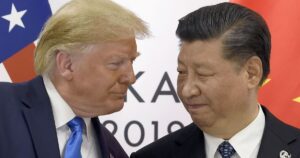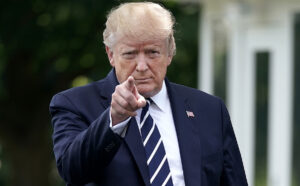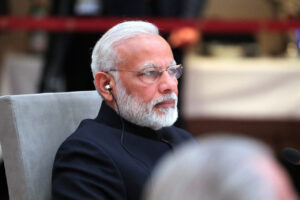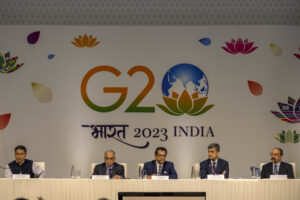
Chinese President Xi Jinping will not attend next week’s Group of 20 summit, dealing a blow to South Africa, which is already facing a boycott by US President Donald Trump, Bloomberg reports.
China’s Foreign Ministry announced on Thursday that Premier Li Keqiang will represent the country at the leaders’ summit, which begins in Johannesburg on November 22. The statement did not explain why Xi, who attended the event last year, will be absent this time.
Xi’s decision means that the summit, created to address geopolitical and economic issues and usually attended by heads of state, will not be attended by the leaders of the world’s two largest economies and another member country, Russia. Last week, Trump said that no American officials would attend the summit after he attacked South Africa with false claims of genocide against white Afrikaners. Russian President Vladimir Putin’s trip remains limited due to an arrest warrant issued by the International Criminal Court,” the statement said.
Other G-20 leaders, including Javier Milei of Argentina and Claudia Sheinbaum of Mexico, will also not travel to South Africa. However, several European leaders, as well as Brazilian President Luiz Inacio Lula da Silva and his Turkish counterpart Recep Tayyip Erdogan, plan to be there.
Lin Jian, spokesperson for China’s Foreign Ministry, said at a regular briefing on Thursday that the meeting in Johannesburg “has important historical significance” as it is the first G20 summit on the African continent, and expressed support for South Africa as the host country.
Li, China’s second-highest-ranking official, has represented Xi at other major international events in recent years. He stood in for the president at the G20 summit in India in 2023 and at the BRICS leaders’ meeting in Brazil in July.
South African officials say in private comments that the absence of the US may make it easier to reach agreement on the declaration, which they believe will be an indicator of the success of the country’s G20 presidency before handing over to Washington in December.

US President Donald Trump has said that representatives of his administration will not participate in the G20 summit, which will take place on November 22-23, 2025, in Johannesburg, citing “violations of the rights” of white South Africans. He announced this on the social network Truth Social, and his position has been reported by leading publications.
According to Trump, holding G20 meetings in South Africa is a “disgrace,” and the country’s authorities allow the murder and illegal seizure of land from Afrikaners. The South African side called such statements unfounded and “regretted” the US decision.
South Africa will chair the G20 in 2025, with a leadership meeting scheduled for November 22-23 in Johannesburg.
The Trump administration has previously signaled a tough stance on South Africa, including public statements on the situation surrounding white farmers, which have been criticized by the expert community and South African officials.
boycott, G20, SOUTH AFRICA, SUMMIT, US

Today marks 365 days since India assumed the G20 Presidency. It is a moment to reflect, recommit, and rejuvenate the spirit of ‘Vasudhaiva Kutumbakam, ‘One Earth, One Family, One Future.’
As we undertook this responsibility last year, the global landscape grappled with multifaceted challenges: recovery from the Covid-19 pandemic, looming climate threats, financial instability, and debt distress in developing nations, all amid declining multilateralism. In the midst of conflicts and competition, development cooperation suffered, impeding progress.
Assuming the G20 Chair, India sought to offer the world an alternative to status quo, a shift from a GDP-centric to human-centric progress. India aimed to remind the world of what unites us, rather than what divides us. Finally, the global conversation had to evolve – the interests of the few had to give way to the aspirations of the many. This required a fundamental reform of multilateralism as we knew it.
Inclusive, ambitious, action-oriented, and decisive—these four words defined our approach as G20 president, and the New Delhi Leaders’ Declaration (NDLD), unanimously adopted by all G20 members, is testimony to our commitment to deliver on these principles.
Inclusivity has been at the heart of our presidency. The inclusion of the African Union (AU) as a permanent member of the G20 integrated 55 African nations into the forum, expanding it to encompass 80% of the global population. This proactive stance has fostered a more comprehensive dialogue on global challenges and opportunities.
The first-of-its-kind ‘Voice of the Global South Summit,’ convened by India in two editions, heralded a new dawn of multilateralism. India mainstreamed the Global South’s concerns in international discourse and has ushered in an era where developing countries take their rightful place in shaping the global narrative.
Inclusivity also infused India’s domestic approach to G20, making it a People’s Presidency that befits that world’s largest democracy. Through “Jan Bhagidari” (people’s participation) events, G20 reached 1.4 billion citizens, involving all states and Union Territories (UTs) as partners. And on substantive elements, India ensured that international attention was directed to broader developmental aims, aligning with G20’s mandate.
At the critical midpoint of the 2030 Agenda, India delivered the G20 2023 Action Plan to Accelerate Progress on the Sustainable Development Goals (SDGs), taking a cross-cutting, action-oriented approach to interconnected issues, including health, education, gender equality and environmental sustainability.
A key area driving this progress is robust Digital Public Infrastructure (DPI). Here, India was decisive in its recommendations, having witnessed the revolutionary impact of digital innovations like Aadhaar, UPI, and Digilocker first-hand. Through G20, we successfully completed the Digital Public Infrastructure Repository, a significant stride in global technological collaboration. This repository, featuring over 50 DPIs from 16 countries, will help the Global South build, adopt, and scale DPI to unlock the power of inclusive growth.
For our One Earth, we introduced ambitious and inclusive aims to create urgent, lasting, and equitable change. The Declaration’s ‘Green Development Pact’ addresses the challenges of choosing between combating hunger and protecting the planet, by outlining a comprehensive roadmap where employment and ecosystems are complimentary, consumption is climate conscious, and production is planet-friendly. In tandem, the G20 Declaration calls for an ambitious tripling of global renewable energy capacity by 2030. Coupled with the establishment of the Global Biofuels Alliance and a concerted push for Green Hydrogen, the G20’s ambitions to build a cleaner, greener world is undeniable. This has always been India’s ethos, and through Lifestyles for Sustainable Development (LiFE), the world can benefit from our age-old sustainable traditions.
Further, the Declaration underscores our commitment to climate justice and equity, urging substantial financial and technological support from the Global North. For the first time, there was a recognition of the quantum jump needed in the magnitude of development financing, moving from billions to trillions of dollars. G20 acknowledged that developing countries require $5.9 trillion to fulfil their Nationally Determined Contributions (NDCs) by 2030.
Given the monumental resources required, G20 emphasised the importance of better, larger, and more effective Multilateral Development Banks. Concurrently, India is taking a leading role in UN reforms, especially in the restructuring of principal organs like the UN Security Council, that will ensure a more equitable global order.
Gender equality took centre stage in the Declaration, culminating in the formation of a dedicated Working Group on the Empowerment of Women next year. India’s Women’s Reservation Bill 2023, reserving one-third of India’s Parliament and state legislative assembly seats for women epitomizes our commitment to women-led development.
The New Delhi Declaration embodies a renewed spirit of collaboration across these key priorities, focusing on policy coherence, reliable trade, and ambitious climate action. It is a matter of pride that during our Presidency, G20 achieved 87 outcomes and 118 adopted documents, a marked rise from the past.
During our G20 Presidency, India led deliberations on geopolitical issues and their impact on economic growth and development. Terrorism and the senseless killing of civilians is unacceptable, and we must address it with a policy of zero-tolerance. We must embody humanitarianism over hostility and reiterate that this is not an era of war.
I am delighted that during our Presidency India achieved the extraordinary: it revitalised multilateralism, amplified the voice of the Global South, championed development, and fought for the empowerment of women, everywhere.
As we hand over the G20 Presidency to Brazil, we do so with the conviction that our collective steps for people, planet, peace, and prosperity, will resonate for years to come.

G20 summit participants have reached consensus on the text of the final declaration, the document has been adopted, Indian Prime Minister Narendra Modi said on Saturday.
“Thanks to our hard work, and with your support on the declaration of the leaders of the G20 summit in New Delhi, there is consensus. I announce the adoption of the declaration,” Times of India quoted the prime minister as saying.
Modi also thanked all those who made the adoption of the final document possible.
The publication specifies that the declaration will be made public on Sunday at the end of the summit, and its adoption was a victory for India, currently chairing the G20. At the same time, there were deep disagreements among the G20 participants over Russia’s war against Ukraine and the issue of monetary compensation for involvement in climate change.
Earlier, the Indian Prime Minister gave his assessment of globalization. His position is described in more detail here – https://open4business.com.ua/ru/premer-ministr-indii-dal-svoyu-oczenku-proczessu-globalizaczii/.